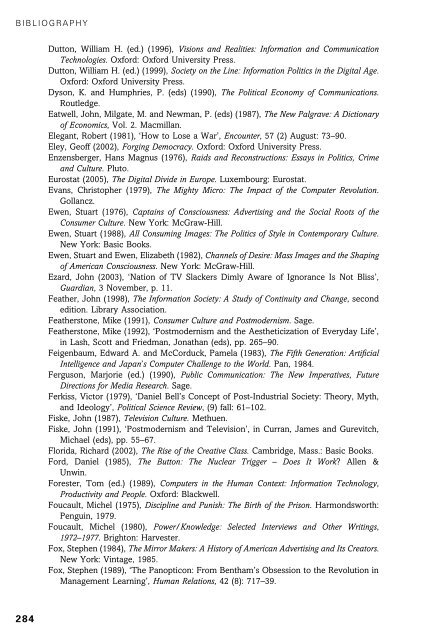Theories of the Information Society, Third Edition - Cryptome
Theories of the Information Society, Third Edition - Cryptome
Theories of the Information Society, Third Edition - Cryptome
Create successful ePaper yourself
Turn your PDF publications into a flip-book with our unique Google optimized e-Paper software.
BIBLIOGRAPHY<br />
Dutton, William H. (ed.) (1996), Visions and Realities: <strong>Information</strong> and Communication<br />
Technologies. Oxford: Oxford University Press.<br />
Dutton, William H. (ed.) (1999), <strong>Society</strong> on <strong>the</strong> Line: <strong>Information</strong> Politics in <strong>the</strong> Digital Age.<br />
Oxford: Oxford University Press.<br />
Dyson, K. and Humphries, P. (eds) (1990), The Political Economy <strong>of</strong> Communications.<br />
Routledge.<br />
Eatwell, John, Milgate, M. and Newman, P. (eds) (1987), The New Palgrave: A Dictionary<br />
<strong>of</strong> Economics, Vol. 2. Macmillan.<br />
Elegant, Robert (1981), ‘How to Lose a War’, Encounter, 57 (2) August: 73–90.<br />
Eley, Ge<strong>of</strong>f (2002), Forging Democracy. Oxford: Oxford University Press.<br />
Enzensberger, Hans Magnus (1976), Raids and Reconstructions: Essays in Politics, Crime<br />
and Culture. Pluto.<br />
Eurostat (2005), The Digital Divide in Europe. Luxembourg: Eurostat.<br />
Evans, Christopher (1979), The Mighty Micro: The Impact <strong>of</strong> <strong>the</strong> Computer Revolution.<br />
Gollancz.<br />
Ewen, Stuart (1976), Captains <strong>of</strong> Consciousness: Advertising and <strong>the</strong> Social Roots <strong>of</strong> <strong>the</strong><br />
Consumer Culture. New York: McGraw-Hill.<br />
Ewen, Stuart (1988), All Consuming Images: The Politics <strong>of</strong> Style in Contemporary Culture.<br />
New York: Basic Books.<br />
Ewen, Stuart and Ewen, Elizabeth (1982), Channels <strong>of</strong> Desire: Mass Images and <strong>the</strong> Shaping<br />
<strong>of</strong> American Consciousness. New York: McGraw-Hill.<br />
Ezard, John (2003), ‘Nation <strong>of</strong> TV Slackers Dimly Aware <strong>of</strong> Ignorance Is Not Bliss’,<br />
Guardian, 3 November, p. 11.<br />
Fea<strong>the</strong>r, John (1998), The <strong>Information</strong> <strong>Society</strong>: A Study <strong>of</strong> Continuity and Change, second<br />
edition. Library Association.<br />
Fea<strong>the</strong>rstone, Mike (1991), Consumer Culture and Postmodernism. Sage.<br />
Fea<strong>the</strong>rstone, Mike (1992), ‘Postmodernism and <strong>the</strong> Aes<strong>the</strong>ticization <strong>of</strong> Everyday Life’,<br />
in Lash, Scott and Friedman, Jonathan (eds), pp. 265–90.<br />
Feigenbaum, Edward A. and McCorduck, Pamela (1983), The Fifth Generation: Artificial<br />
Intelligence and Japan’s Computer Challenge to <strong>the</strong> World. Pan, 1984.<br />
Ferguson, Marjorie (ed.) (1990), Public Communication: The New Imperatives, Future<br />
Directions for Media Research. Sage.<br />
Ferkiss, Victor (1979), ‘Daniel Bell’s Concept <strong>of</strong> Post-Industrial <strong>Society</strong>: Theory, Myth,<br />
and Ideology’, Political Science Review, (9) fall: 61–102.<br />
Fiske, John (1987), Television Culture. Methuen.<br />
Fiske, John (1991), ‘Postmodernism and Television’, in Curran, James and Gurevitch,<br />
Michael (eds), pp. 55–67.<br />
Florida, Richard (2002), The Rise <strong>of</strong> <strong>the</strong> Creative Class. Cambridge, Mass.: Basic Books.<br />
Ford, Daniel (1985), The Button: The Nuclear Trigger – Does It Work? Allen &<br />
Unwin.<br />
Forester, Tom (ed.) (1989), Computers in <strong>the</strong> Human Context: <strong>Information</strong> Technology,<br />
Productivity and People. Oxford: Blackwell.<br />
Foucault, Michel (1975), Discipline and Punish: The Birth <strong>of</strong> <strong>the</strong> Prison. Harmondsworth:<br />
Penguin, 1979.<br />
Foucault, Michel (1980), Power/Knowledge: Selected Interviews and O<strong>the</strong>r Writings,<br />
1972–1977. Brighton: Harvester.<br />
Fox, Stephen (1984), The Mirror Makers: A History <strong>of</strong> American Advertising and Its Creators.<br />
New York: Vintage, 1985.<br />
Fox, Stephen (1989), ‘The Panopticon: From Bentham’s Obsession to <strong>the</strong> Revolution in<br />
Management Learning’, Human Relations, 42 (8): 717–39.<br />
284
















